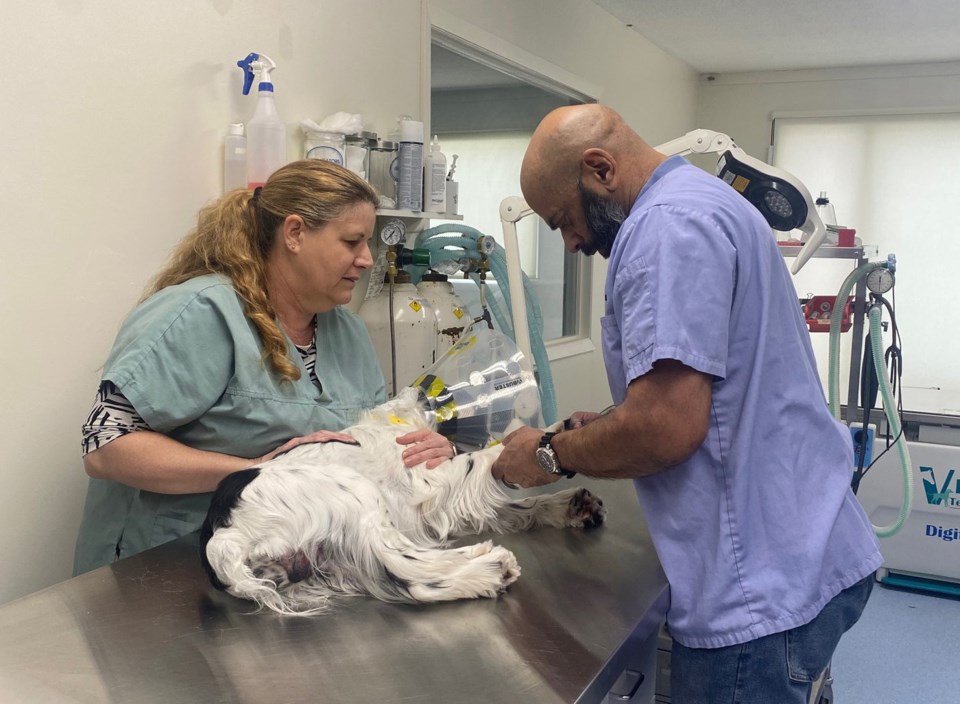Whenever Sarah Driediger's dog Hero needs medical attention, the Thompson, Man., woman will now have to pack up her vehicle and drive eight hours south to Winnipeg.
That's because the northern city's only full-time veterinary clinic closed at the beginning of this year.
Pet owners in the city of about 13,000 and nearby communities will have to head south for services, or rely on pop-up clinics hosted by pet rescues or outside veterinary practices, to access care for their furry loved ones.
"It's hard to find somebody. We have quite a few vets that are eager to come and help, but not to come and stay," Driediger said in a recent interview.
"Even if we have a vet once a week or once a month, that's not enough. It's not going to work in an emergency."
The Thompson clinic was one of two veterinary practices in northern Manitoba. The next closest are in The Pas, about four hours away by car, or Winnipeg.
Driediger had to make such trips twice last summer with her dog, who at one point had to be hospitalized at the veterinary college in Saskatoon.
While the trips went relatively smoothly for her and Hero, Driediger has heard of others who got into crashes in snowy conditions — or worse.
“There are situations where by the time you really know it’s an emergency, eight hours is too long. I have heard of people whose pets have passed away on the highway," she said.
“It’s a reality for us and it’s not good.”
Driediger is part of a non-profit group in Thompson called Northern Pet Care that started two years ago to find a solution for more long-term veterinary care in the city.
For a number of years, the city has depended on private practices that have been run solo by a veterinarian. This requires the doctor to find a space, buy equipment, hire staff and run the business while also attending to thousands of pets.
This has often led to burnout and periods when the city has been without a vet, like it's currently facing, said Driediger.
The group would eventually like to purchase the building and equipment the previous veterinarian was using. It is also working on recruiting additional staff to make it more desirable for a doctor to relocate.
Provincial laws require a clinic to be owned by a veterinarian or a veterinary corporation. Driediger said the non-profit is working with a lawyer to see how Northern Pet Care can play a role.
Dr. Ainsley Dyson understands the challenges of operating a clinic in Manitoba's north.
Dyson and his wife have owned Northern Veterinary Clinic in The Pas for the past 26 years. The small animal clinic services the town, nearby communities and First Nations.
For the past several years, the Dysons have also fielded more requests from people in Thompson, particularly for surgeries not offered there.
The couple has had to deal with burnout, challenges retaining staff and isolation throughout their time in The Pas, a town of 5,600.
"It's not easy to find somebody who's prepared to take on challenges and work in less-than-ideal conditions, because that's kind of the reality of it," he said.
But, he added, for an adventurous person who thrives in a demanding setting, practising in the north can be rewarding.
In the meantime, pet rescues, including the Thompson Humane Society, are working with organizations in the south to bring relief services throughout the year.
The Winnipeg Humane Society's One Health program is scheduled to put on four clinics this year offering spay and neuter procedures, vaccines and implants. The program hosts remote clinics in rural and northern communities with scarce vet services.
Veronica Dueck, the program's manager, said gaps in veterinary care are detrimental to health and safety in those regions.
“We’ve seen it many times that (viruses) will go through a community and will wipe out a very high percentage of the dogs in the community," she said.
"That’s very preventable just with a vaccine, but if there’s no veterinary services offered, that’s impossible.”
Dueck is calling for more vet programs and more incentives for Indigenous students to help address the shortage.
“Having regular veterinary services is just a relief for most pet owners.”
This report by The Canadian Press was first published Jan. 11, 2025.
Brittany Hobson, The Canadian Press


